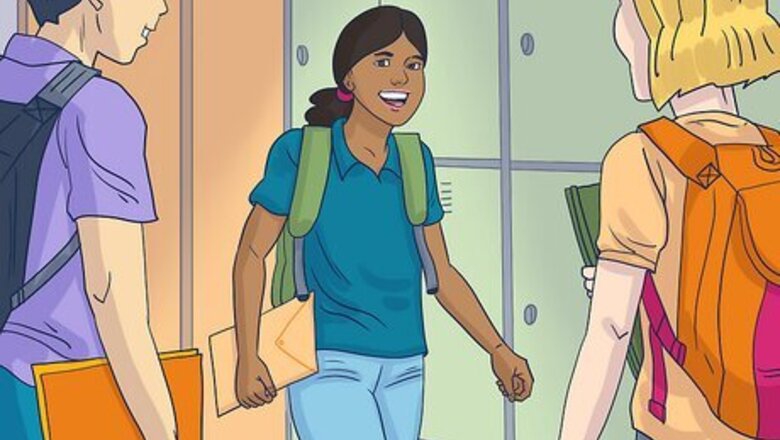
views
Make eye contact and smile in the hallways.
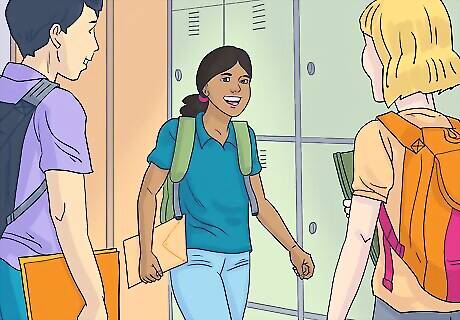
Classmates will be more open if you seem confident and approachable. Hold your head up and make eye contact with people as you pass. Even if you don't know someone, a kind smile shows that you're friendly. If they smile back, you could have the opportunity to strike up a conversation or get to know them better. Put your phone away while you're in the hallway as well. If you look up and offer a smile as you pass, it shows that you're ready and willing to strike up a conversation.
Introduce yourself to people who seem friendly.
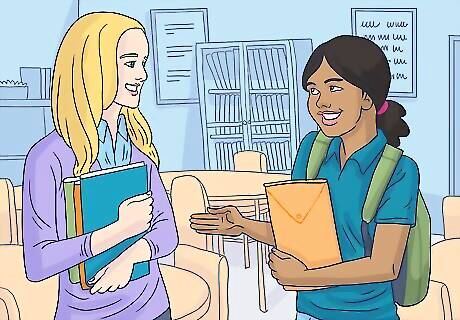
Start by offering your name and pronouns. A basic introduction is a great way to put yourself out there. You might also mention something that you like to do. Clinical therapist Rebecca Tenzer notes that "sometimes, all it takes is a friendly introduction. Don't hesitate to approach someone who looks approachable and start up a conversation." For example, you might introduce yourself by saying, "Hi, I'm Trish, I use she/her pronouns. I just transferred here. Is this seat taken?"
Approach someone sitting alone at lunch.
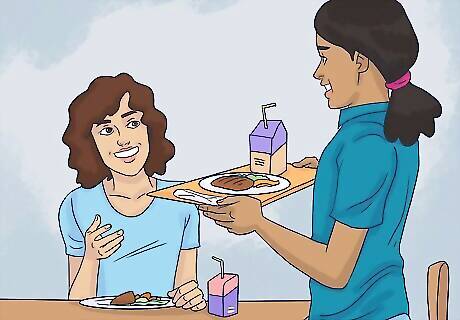
That person might be in the same boat as you. Sitting down next to someone sitting by themselves is an easy, non-intimidating way to strike up a conversation with someone new. You might also look for someone who tends to keep to themselves in class. For example, you might simply ask, "Is this seat taken?" or "Can I sit with you?" and then introduce yourself. Clinical therapist Rebecca Tenzer encourages you to "seek out open seating areas where others might be looking for company as well. Cafeterias or communal spaces often have spots where students can join any table."
Lend a hand to a classmate in need.
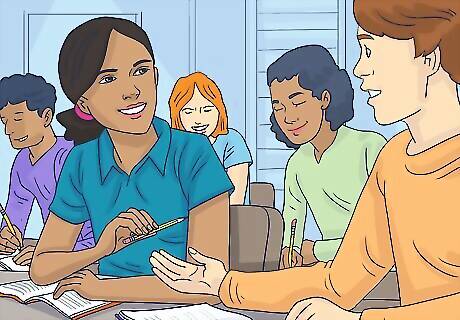
Helping a classmate creates a great opportunity for friendship. You might help someone pick up the notebooks or textbooks they dropped or let a neighbor borrow a pencil. Being kind and considerate is a great way to stand out from the rest of the crowd. Clinical therapist Rebecca Tenzer notes that "helping others fosters goodwill and strengthens social bonds." Other things you might do include offering part of your lunch to someone who forgot theirs or offering to deliver homework to a student who missed class. Don't forget about volunteering in your school or community! Tenzer adds that "volunteering is not only a selfless way to give back to the community but also an excellent way to meet people... who share your values and interests."
Crack a joke to get people laughing.
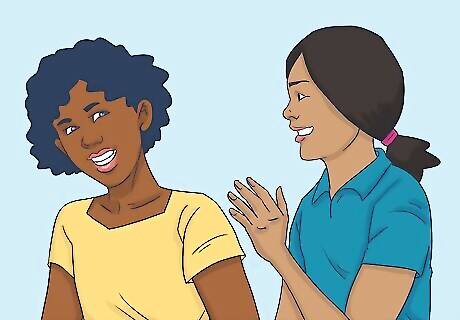
Sharing a laugh is a sure-fire way to start a new friendship. Clinical therapist Rebecca Tenzer notes that "a good sense of humor can be very appealing." But she cautions you to "use humor wisely and avoid making jokes at the expense of others. Remember, people are usually attracted to kindness." Any funny quip or spur-of-the-moment joke will work. For example, you might say, "With all this homework, I think the only sleep I'll be getting is on the bus," or "The school cafeteria should be paying us to eat this food."
Offer a compliment to someone who catches your eye.

A compliment is a great way to put someone at ease. Clinical therapist Rebecca Tenzer notes that "offering a genuine compliment can be a great icebreaker." It's a pretty stress-free way to strike up a conversation too, especially if you're worried about putting yourself out there. For example, you might say, "I love your Ocean City sweatshirt! Do you go to the shore often?" You might also try complimenting someone on something they've said or done. For example, you might say, "I really appreciated what you said in English class. I've never thought about that character that way."
Ask open-ended questions to start a conversation.
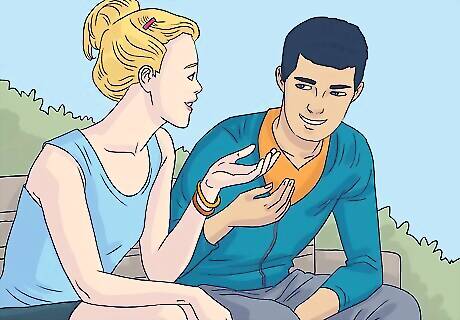
Start with a general, casual question about a broad topic. Asking about a classmate's favorite classes, favorite TV shows, or favorite hobbies is a great place to start. Then, ask a follow-up question based on their answer. If they say something you've never heard of, ask them why they like it or what it's about. Clinical therapist Rebecca Tenzer encourages you to "ask questions... that demonstrate your curiosity about their lives and experiences." Therapist Ebony Eubanks notes that while you don't necessarily need to be outgoing, if you're proactive and initiate conversations it shows that you're interested in making a connection.
Listen attentively during your conversations.
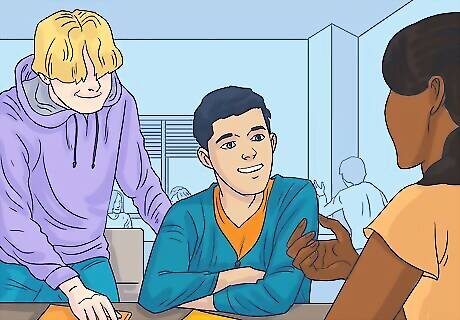
Show that you're curious about your classmates' experiences. To practice active listening, clinical therapist Rebecca Tenzer recommends that you "show interest in what others have to say, ask follow-up questions, and be empathetic. Make sure you make eye contact, smile, and then allow time for you to add information about yourself." Don't forget to bring up details from a previous conversation later! Remembering to follow up on something someone mentioned before is a great way to show that you're a genuine, caring person.
Keep your eye out for classmates with common interests.
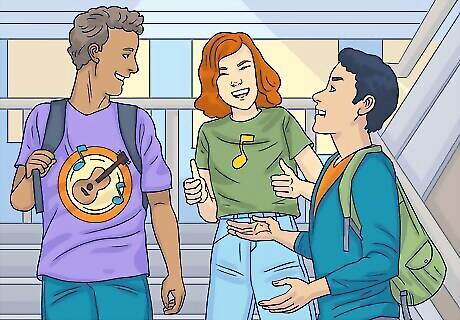
Look at your classmates' styles and activities. Do you see someone reading your favorite book or wearing a T-shirt for one of your favorite bands? That's a built-in conversation starter! These common interests can serve as a great jumping-off point and help you find people you're more likely to get along with. At the same time, don't be afraid to connect with people who have different backgrounds or interests. Clinical therapist Rebecca Tenzer cautions against limiting yourself to a specific group when "sometimes, unexpected friendships can be the most rewarding."
Connect with classmates over social media.

A quick comment or share could spark a new friendship. Did someone at your school post a video of a cool painting they're working on? Comment and let them know you love their technique. Or maybe a kid in your class shared a pic of themselves playing basketball over the weekend. If you love basketball too, you might ask where the best spots to play are. By putting yourself out there and being friendly, you could really hit it off with someone. Clinical therapist Rebecca Tenzer notes that "many schools have Facebook groups or other social media platforms where students can connect and make plans." There are also ways you can build and strengthen your connection to classmates online. Therapist Ebony Eubanks mentions playing different online games or "watching movies together via FaceTime or Zoom... [and talking] as you're watching them, so you can make connections with them." Keep in mind that not everyone is going to respond or be interested, and that's okay! There could be a million different reasons why someone doesn't respond, so don't take it personally. There are always other people out there to connect with.
Join a club or sports team to meet like-minded people.
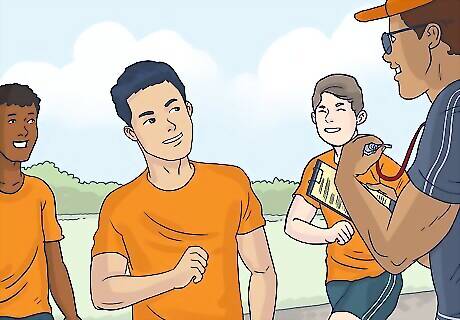
After-school activities are chock full of potential friends. Look at your school's registry of clubs and sports to see if anything really sticks out to you. The great thing about a club or sports team is that you already have something in common and plenty to talk about. You're also getting the opportunity to do something fun. School counselor Ashley Pritchard notes that you can also "ask your school counselor for different clubs or sports... or have your counselor get you in touch with a coach or another student who they know who is involved in that. And then that's a good way to kind of meet somebody who has similar likes and interests." Clinical therapist Rebecca Tenzer adds that "whether it's a drama club, a sports team, or a chess club, these groups provide opportunities to connect with people who share your passions." Your gym class is also a great place to meet new friends. Physical education teacher Paige Bowen notes that this is because "a lot of times we pair off into partners or we make groups of 5 or 6 at a time. So it's trusting yourself and going ahead and jumping in and not being afraid and joining a group."
Go to social events to mix and mingle.
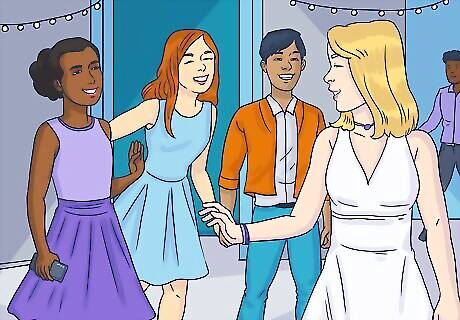
School dances and sports events are great ways to meet new people. Your school's calendars or morning announcements help you see what's coming up. Clinical therapist Rebecca Tenzer notes that "schools often organize social events, dances, or parties. Attend these gatherings to meet new people in a relaxed and social setting. Don't be afraid to strike up conversations and introduce yourself." These activities also help you feel like a part of the community and student body so that you feel like you belong. For example, you might go to your school's Friday night football game and sit in the student section.
Meet new people through friendship apps.

Friendship apps offer a low-pressure way to meet new people. Apps such as Bumble BFF and Friender focus on platonic relationships rather than dating and can help "match" you with people you're likely to vibe with. If you prefer to go out and about, apps such as "Meetup" or "Nearify" can help you find activities and events in your area that might align with your interests. Clinical therapist Rebecca Tenzer also recommends that you "use apps designed for meeting new people in your area."
Sign up for an improv class to easily break the ice.
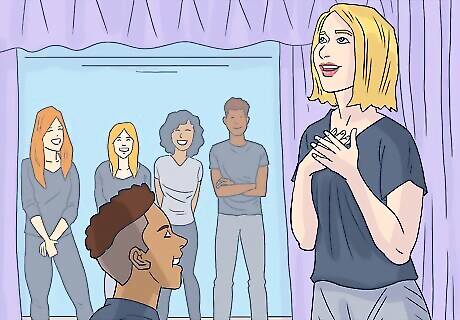
Use an improv class to help reduce social anxiety. These types of activities give you a way to meet new people while also boosting your creativity. In addition to your school, check local theater groups to see what kinds of classes are available where you live. You'll find a fun way to reduce stress and gain confidence, which can make it even easier to continue to meet new people. Studies show that improv classes also make it easier for you to face uncertainty with confidence, which also improves your ability to feel more at ease in social situations.
List your best qualities to psych yourself up.

Boost your confidence by thinking about what you have to offer. Once you see all of the good things about yourself, you'll feel a lot more comfortable going out and talking to some new people. When you feel good about yourself, other people will want to feel good about you too. Embrace what makes you special, including your personality, talents, hobbies, and interests. Remember that real, worthwhile friends will appreciate every part of you and won't expect you to change to hang out with them. A fun trick you can use for this is to think of your favorite celebrities. Write down qualities that both you and they possess to help you feel more confident.
Be yourself.
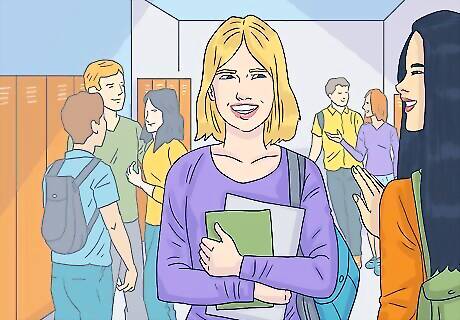
There's no need to change who you are just to fit in. For clinical therapist Rebecca Tenzer, "Authenticity is key to forming lasting friendships. Be true to yourself and let your genuine personality shine. People are more likely to connect with you when you're authentic." Do the things that you love and speak your mind. Classmates who have similar interests or feel the same way will feel comfortable reaching out to you. Students in school often gravitate towards specific social groups because of their interests, such as someone who's naturally athletic being a "jock." If you stick to things you're genuinely interested in, you'll find the group where you belong. Tenzer adds that "if you're struggling in this area, working on self-esteem is always a good first step."


















Comments
0 comment